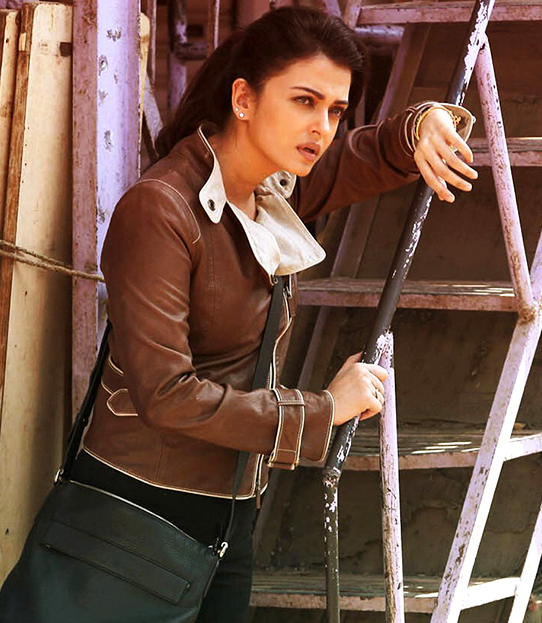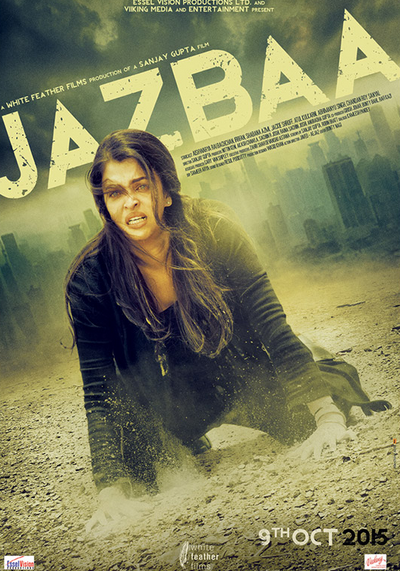On October 9, Aishwarya Rai Bachchan will return to the silver screen after five years as a desperate mother trying to save her kidnapped daughter in Jazbaa. The film, directed by Sanjay Gupta and costarring Irrfan Khan, is naturally being termed the actress’s “comeback”. One has to ask, where exactly is she coming back from? And what does it mean for an actress if her first film after a hiatus fails?
There are certain instances, of course, when the word “comeback” seems appropriate. Robert Downey Jr. made a grand comeback in Hollywood after a stint in jail and several trips to rehab that left him practically unemployable in an industry that requires its actors to be insured before they can receive financial backing for their projects. It was only after Mel Gibson personally agreed to pay Downey’s insurance bond for the 2003 film The Singing Detective that the road was paved for him to return to the Hollywood A-List. It’s the kind of comeback story we all love, one that celebrates a beloved star’s triumph over his demons…a story that often has a very different, very tragic ending.
Addiction, mental health issues, run-ins with the law; these are the things that typically drag entertainers down into the depths of professional obscurity. Occasionally, of course, the stars themselves opt out of a thriving career, as Sridevi did when she left the limelight for a life of domestic bliss with her two daughters and husband Boney Kapoor. After 15 years, Sridevi made her return to films in the 2012 hit English Vinglish, a feminist-friendly tale that was the cherry on top of the so-called Empress of Bollywood’s reinstatement to filmi royalty. Such a feat is rare, and therefore deservedly called a successful comeback.
Aishwarya, on the other hand, never really left the limelight. Sure, she hasn’t made a movie in five years. But that doesn’t mean she wasn’t constantly in the public eye. From her pregnancy and the birth of her daughter, to her postpartum weight gain, to her annual appearances on the Cannes red carpet, her every move has been tracked and scrutinized by the media. Every time she stepped out of her house, her pictures ended up on the internet. The first photos of baby Aaradhya became the Indian paparazzi’s Holy Grail. Her endorsements, ranging from L’Oreal to TTK Prestige to Kalyan, have ensured that her image is a permanent fixture in print and on television. And to this day, the shape of her body is a constant point of public discussion. Regardless of whether or not she appeared in films, her day-to-day existence was enough to cement her position among Bollywood’s elite.
How, then, can Aishwarya ‘come back’ if she never really went away in the first place?
It seems obvious by now that the idea of a comeback is unfairly gendered in Bollywood. When Aamir Khan took a four-year hiatus from films after the release of Dil Chahta Hai, no one seemed particularly surprised by his return to the silver screen in Mangal Pandey. And despite experiencing a personal and professional low that lasted several years, the public hadn’t yet written off Salman Khan when Dabangg released in 2010. These men were never forgotten about, and their next release was never treated as a defining moment in their careers.
The same cannot be said for several high profile female stars who have, in recent years, returned to films after a short break. Only two years separated the releases of Dil Bole Hadippa! and No One Killed Jessica, yet the latter was unjustly referred to as Rani Mukerji’s comeback film, with the future of her career apparently dependent upon its success. Preity Zinta’s film hiatus was slightly longer at five years, and yet despite maintaining a constant public presence as the owner of a cricket team and as a talk show host, the failure of her home production Ishqk In Paris was enough for the media to begin writing her obituary as a mainstream actress. Once in-demand actresses like Karisma Kapoor and Madhuri Dixit have received similar treatment after their “comeback” films failed. And now, it’s Aishwarya’s head on the chopping block. No doubt there are several members of the media whose fingers are hovering over their keyboard, ready to write her off or embrace her depending on how well Jazbaa performs.
Some will say that this is an overreaction, that a star is only as successful as his or her last film. This, of course, is untrue, with many male stars given multiple chances to redeem themselves after a film’s failure (think Ranbir Kapoor), and star kids continuing to find work despite an unenviable box office record (think Abhishek Bachchan). Some actors are able to coast on the good will of the industry. Sadly, this isn’t the case for many female A-listers. It seems that irrespective of how famous you are, after a certain age, you are living on borrowed time.
So let’s call Aishwarya’s “comeback” what it really is: it’s a comeback from marriage, from motherhood, from turning 40. As long as Aishwarya has beauty on her side and the backing of powerful friends and family members, she will be valued. But the moment any of those advantages begin to fade, there is a section of the media and the public that will delight in her downfall.
In a few years’ time, compare the conversation surrounding Jazbaa to the one that will inevitably take place upon Sanjay Dutt’s first film release post his stint in jail. The truth is that men make heroic returns to stardom after overcoming true obstacles like addiction and incarceration. Women, on the other hand, return hesitantly after committing the greatest crime of all: daring to grow older and make time for a personal life.
So please, don’t call Jazbaa a comeback. Give Aishwarya the credit she deserves. Jazbaa is merely a pioneering Bollywood superstar returning to her rightful place on the marquee, an event her fans eagerly await.

